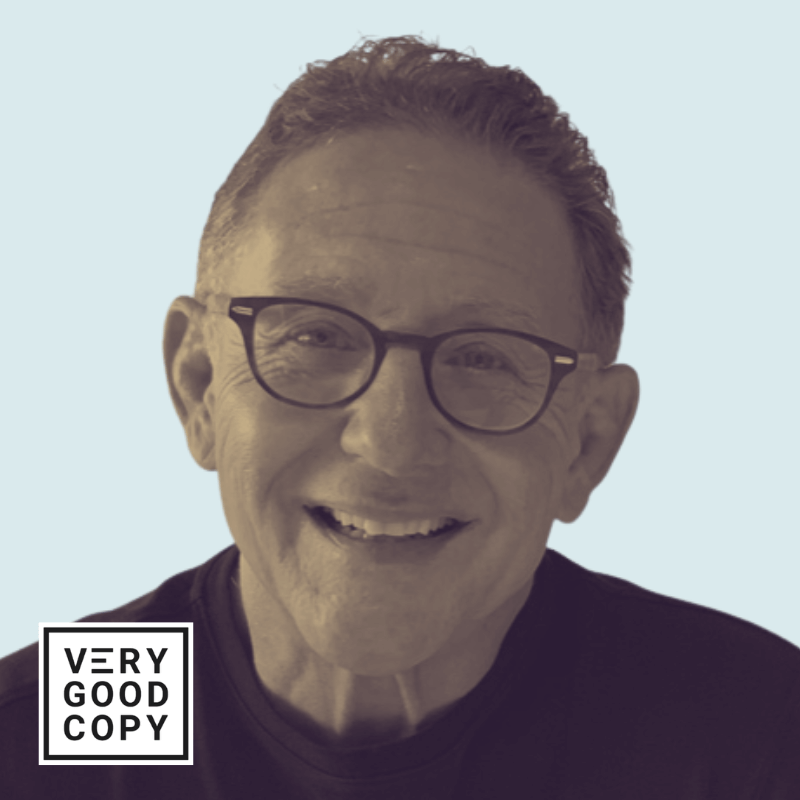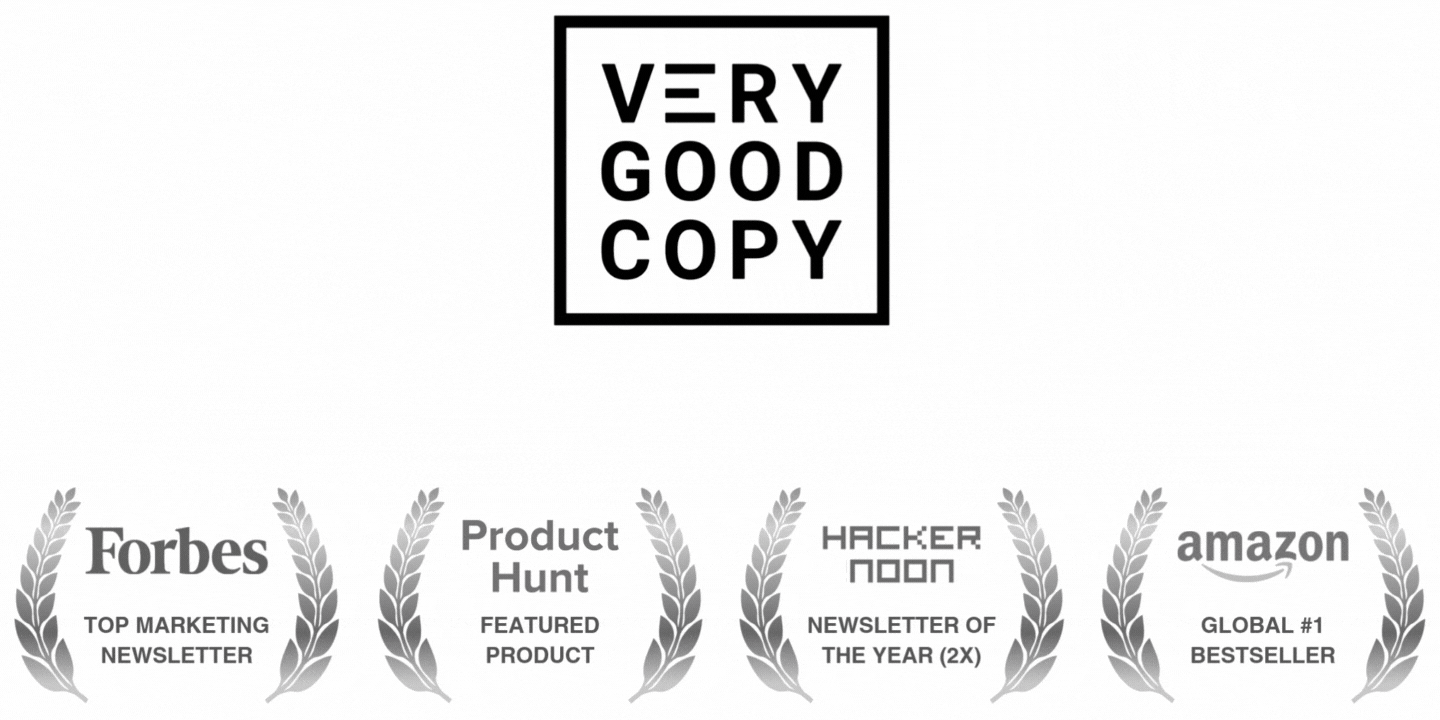EDITOR’S NOTE:
Last month, I interviewed copywriting great, Ben Settle.
I asked him about the copywriters he studied and admired, the writers he looked up to.
Ben gave me a list — and Doug D’Anna was at the top of it. “Doug’s a master,” he said.
And he has the track record to prove it:
Over his 30-year career, Doug’s copy generated over $125 million in sales for direct marketing powerhouses like Forbes, Prevention Health Books, and Phillips Investment Resources (where he became the leading control holder after the renowned Gary Bencivenga retired).
In fact, Bencivenga himself said, “Writers who can consistently create successful direct response campaigns are as rare as trumpeter swans — I know of only about 6 in the entire country. Doug D’Anna is on that short list of star writers I never hesitate to recommend.”
Now I’m excited to say, Doug held nothing back in his Micro-Interview with VeryGoodCopy.
At 944 words, it’s the longest I’ve ever published — and every syllable has its place, its purpose.
Please enjoy this very special, incredibly generous interview with one of the best to ever do it.
Instantly get 6 “micro” courses and series about copywriting when you subscribe to the VeryGoodCopy newsletter for free. Plus...enjoy new content every week. Learn more →
Thank you, Doug.
Let’s get started.
1) “What’s your work routine?”
I’ve always been an early riser. Because I was in such a competitive niche, my mantra was always “You have to get up awfully early to beat Doug D’Anna!”
Which is why I was always up around 4:00 am, working until 6:00 am, when I headed out the door for my five-mile run — only to return to shower up and take the kids to school. I would then hit it until 3:00 pm, school pickup time. That was my schedule for at least 20 years.
Now that I’ve climbed the mountain, the schedule is a bit later and the exercise has changed. I will either hit the rowing machine for 20 minutes and the elliptical for 30 minutes or I’ll head out to jiu-jitsu for two hours of training around 11 am. Instead of having to pick up the kids from school (they are men now), I’ll hit the couch for some siesta time.
As for the copywriting work routine, I work in blocks of time. Not that I keep track of time. I don’t really have set hours. Just that when I know when I’m onto something good and the vibe is flowing, I might not get out of the chair for 15 hours. Yes, I will give up my exercise — but only for that day!
As you can tell, the exercise was and is always important to me. The reason: It clears my mind. Brazilian jiu-jitsu is best, because you can’t think about getting stuck on a project when some young guy is trying to choke you out!
You're in the moment. For me, it brings me back to a sense of clarity when I get back to the writing.
2) “What do you know about your work now that you wish you’d known when you first started?”
I wish I had known that it got easier the more I wrote — especially when you are always writing about the same things. So as I struggled to understand, for example, how the dollar, earnings, and sales affected a stock price, that was valuable time, as I can now bring that knowledge to virtually every investment newsletter or trading advisory promotion I write.
Of course, you don’t realize this when you are bleeding in front of a blank screen for a few years acquiring this knowledge. But it will pay off in the end.
Because I have specialized in one thing for 30 years — financial copywriting — I have never had to reinvent the wheel on every project. I am always writing about the same things. As a result, I’m now able to create twice as many winning promotions in half the time.
3) “What did your biggest professional failure teach you?”
The year was 2005. I had just pitched a B-to-C publisher about creating a direct mail campaign, email campaign, and training his people for $50,000. He was a database marketer, and I was a copywriter — we were a match made in heaven. We both couldn’t wait to get started. Sadly, he left a message on my voicemail that he could not get the budget.
At the same time, the investment newsletter business was collapsing with the markets. The publishers I was working with stopped mailing my pieces and all the people I was working with were laid off. I was rocked, since I had really stopped looking for work because I always had it. That was a failure of sorts… but one that I was able to turn around quickly.
I called the B-to-C publisher back and said, “We got along too well to let this thing die. If there was a way I could get you the direct mail, email, and training for not a nickel outside your budget, would you want to know about it?”
He replied, “How the hell are you going to do that?” To which I said, “You're going to bring me in-house as all my clients just got laid off.”
He replied, “Let me see what I can do. My business collapsed two years ago and I was selling golf equipment for minimum wage.” He put me on as a contractor, and I was able to rebuild my business bigger than before.
The lesson: Always be open to and looking for new clients. Whether you accept them is one thing, but the pipeline should always be there.
4) “What’s the #1 thing that has helped you shorten your craft’s learning curve?”
Since I specialize in financial copy, what shortened my learning curve were the great publishers and investment advisors I have worked with.
Because we are, for the most part, content marketers, understanding investments and the economy is the most important thing you should know if you are going to be in this niche.
Because they made understanding the investing field easy, I was able to write my second big control package in weeks rather than months.
5) “What book has helped you the most over your career?”
The original Tested Advertising Methods — not the redo.
I have a library-quality fourth edition printed in 1974. The other one I had and threw away.
6) “And your parting piece of advice?”
As you continue down the copywriting path, you are going to meet marketing directors, product managers, and publishers who are going to reject your copy out of hand.
They are going to give confusing directions and change their minds after you do what they have asked. It comes with the territory. Learn to laugh it off!
However, if you work with great people and get good training, those people will be the exception and not the rule.





